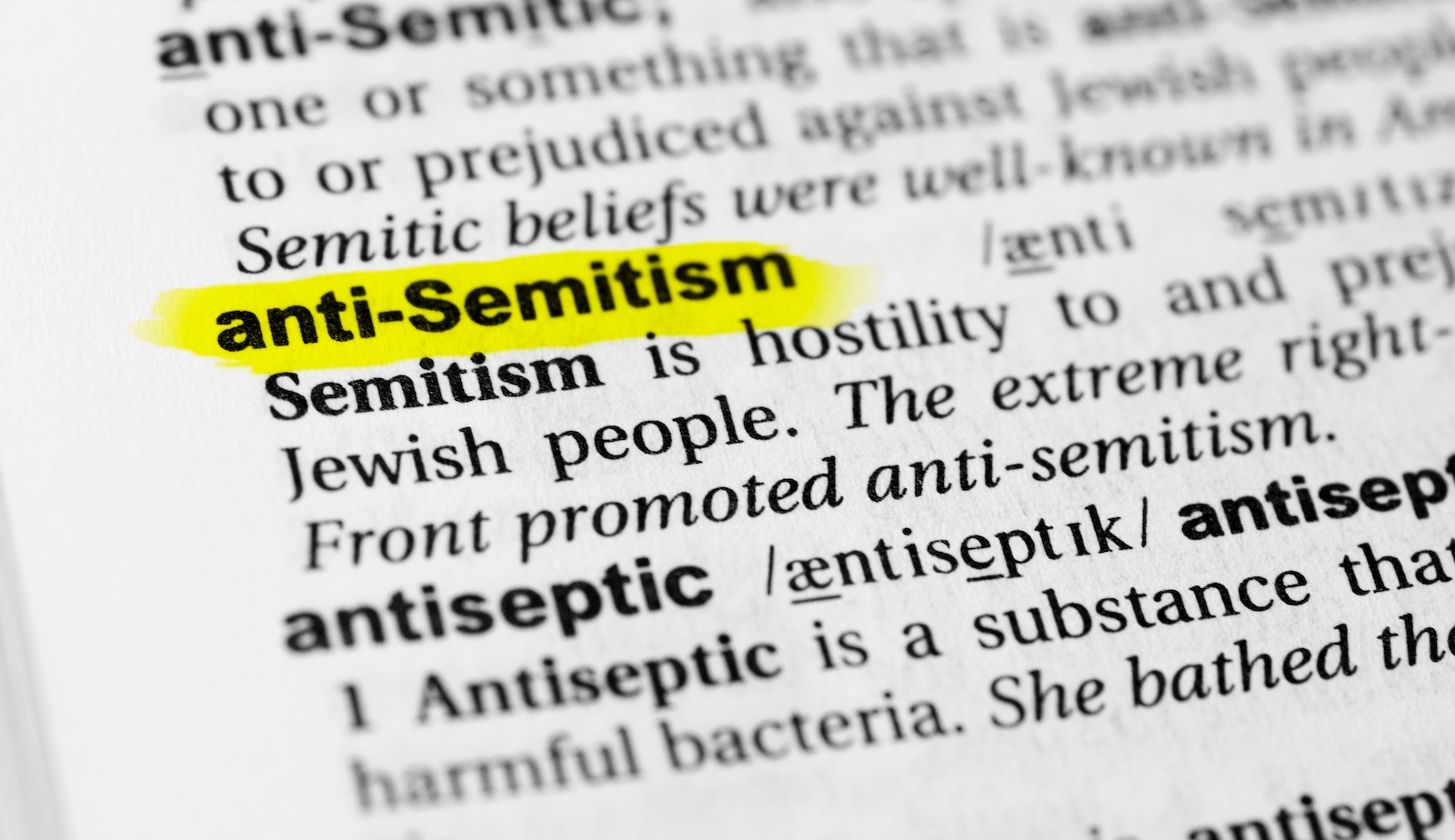The EoZ Definition of Antisemitism
Antisemitism is
hostility toward,
denigration of
malicious lies about or
discrimination against
Jews
as individual Jews,
as a people,
as a religion,
as an ethnic group or
as a nation (i.e., Israel.)
The formatting is deliberate, although not strictly necessary. It emphasizes that there is a list of actions that are included in the definition of antisemitism, as well as a list of potential targets, but the central and immutable point is that Jews are the object of vitriol.
The centrality of Jews to the definition contrasts with the IHRA Working Definition. The core IHRA Working Definition says the targets of hatred may be Jews, non-Jews, Jewish institutions, property or religious facilities. This is not strictly true. The target of antisemites is always Jews, and the others are simply proxies for Jews. For example, synagogues that are converted to churches may still have Jewish symbols on their facades, but they are no longer the objects of attack because there are no Jews associated with them anymore.
The definition has four types of general actions that define antisemitism, and five terms for the object of these actions. The objects represent the different dimensions of what it means to be a Jew.
“Hostility toward Jews” is, I believe, a better formulation than “hate towards Jews.” Hate is internal while hostility is generally noticeable to others. It does little good to make antisemitism a thought crime – antisemites usually don’t admit that they hate Jews, but they often display hostility towards Jews. “Hostility towards Jews” includes violence.
“Denigration of Jews” is any act or speech that unfairly criticizes Jews. This is emphatically not “criticism of Jews” – one can have criticisms of Jews as a people or a nation or as individuals without being antisemitic. Denigration crosses the line from rational to irrational.
“Malicious lies about Jews” includes all conspiracy theories involving Jews, and there are hundreds of them. It also includes any stereotyping of Jews: it is difficult to imagine a more heterogeneous group than Jews are, and any assumption that Jews all are on the same page with any issue is invariably a malicious lie.
“Discrimination against Jews” is obviously antisemitic, just as any discrimination against any people is bigotry. Notably, the IHRA core definition does not mention discrimination.
Now let’s look at the objects, Jews as “X.”
“Jews as individual Jews” means that the words and actions are directed against Jews simply because they are Jews.
“Jews as a people” emphasizes the peoplehood of Jews whether they are religious or not. Jews have been referred to as a people (“
am”) since Biblical times. Attacking Jews as a people is clearly antisemitic.
“Jews as a religion” includes attacking Judaism itself. Again, we are only speaking of unfair or malicious attacks. Judaism may be criticized as may any other religion without it being antisemitic. (Admittedly, the language is a little stilted here.)
“Jews as an ethnic group” includes those who attack Jews for racial or xenophobic reasons. I didn’t want to say “Jews as a racial group” because Jews are emphatically not a racial group. Most Jews are, however, part of an ethnic group and have been discriminated against or attacked on that basis.
Finally, we reach
“Jews as a nation (i.e., Israel.)”
The IHRA definition seems to bend over backwards to treat anti-Zionism as a special case of antisemitism.
It isn’t. Any student of antisemitism knows how modern anti-Zionism is a new label on a very old bottle. Just because there is not complete congruity between Zionism and Judaism is not a reason to treat anti-Zionism as anything other than antisemitism – there is not perfect correspondence between Jews as a people, as a religion or as an ethnic group/tribe, either. Converts to Judaism aren’t ethnic Jews and most Jews aren’t religious. That doesn’t make attacks against those groups any less antisemitic.
The same goes for the modern State of Israel. As the late Rabbi Jonathan Sacks eloquently stated,
Jews have lived in almost every country under the sun. In 4,000 years, only in Israel have they been able to live as a free, self-governing people. …Only in Israel can Jews today speak the Hebrew of the Bible as the language of everyday speech. Only there can they live Jewish time within a calendar structured according to the rhythms of the Jewish year. Only in Israel can Jews once again walk where the prophets walked, climb the mountains Abraham climbed and to which David lifted his eyes. Israel is the only place where Jews have been able to live Judaism in anything other than an edited edition, continuing the story their ancestors began.[iii]
Judaism and Israel are bound together. Jews know this - and the antisemites know this, too. Identifying with the State of Israel is a core component of what it is to be a Jew, not an exception.
Classic antisemitism says Jews poisoned the wells. Modern antisemitism says Israelis poison the wells and water.
Classic antisemitism says Jews delight in killing children. Modern antisemitism says the same about Israelis.
Classic antisemitism says Jews control major world governments. Modern antisemitism says the same about Zionists.
Classic antisemitism excludes Jews from clubs and organizations. Modern antisemitism excludes Zionists from “progressive” spaces.
There is no need to apologize for saying that modern antisemitism, in the guise of anti-Zionism, is just another flavor of classic antisemitism. The similarities dwarf the differences.
The IHRA Working Definition seems defensive when mentioning Israel. It says, “Manifestations [of antisemitism] might include the targeting of the state of Israel, conceived as a Jewish collectivity. However, criticism of Israel similar to that leveled against any other country cannot be regarded as antisemitic.”
How is that different than criticism of Judaism, or criticism of Jews as a people? Any honest criticism is fair game for all those categories of what it means to be a Jew, not just for Israel. The IHRA does no favors by differentiating Israel from Judaism in this context.
We can run this same exercise against all the speech and actions in the first half of my definition. Hostility towards Jews as individual Jews, as a people, as an ethnic group or as a religion is clearly antisemitism – and so is hostility towards Israel as a nation. Hostility goes way beyond sober criticism, and it betrays the irrationality of the hostile party. Why single out Israel in this regard?
Denigration of Israel is similar. What other nation gets regularly denigrated? Saying Israel has no right to exist is on the same moral plane as saying Jews have no right to exist as a people – or that Jews are not a people at all, which is a favored accusation among Arab antisemites specifically to argue that a Israel has no right to exist as a homeland for people who merely share a religion. Again, classic and modern antisemitism are entwined.
Malicious lies about Israel fit in the same category as malicious lies about any group. The malice betrays the hate, and the hate is what drives the malice. The apartheid lie, the ethnic cleansing lie, the racism lie – they are just as illegitimate and revolting as the Christ-killing lie, the Elders of Zion lie, the
Untermensch lie.
The same logic goes with “discrimination against Jews as a nation.” When Israel is discriminated against, we all know it is because it is the only state that is filled with and controlled by Jews. Vehement denials of antisemitism are not arguments.
For the purposes of determining what antisemitism is, Israel is not a special case of the collective Jew.
It is a core example. Nowadays, it is perhaps the paradigm of being a Jewish object of hate.
(full article online )
Blogging about Israel and the Arab world since, oh, forever.

elderofziyon.blogspot.com






















